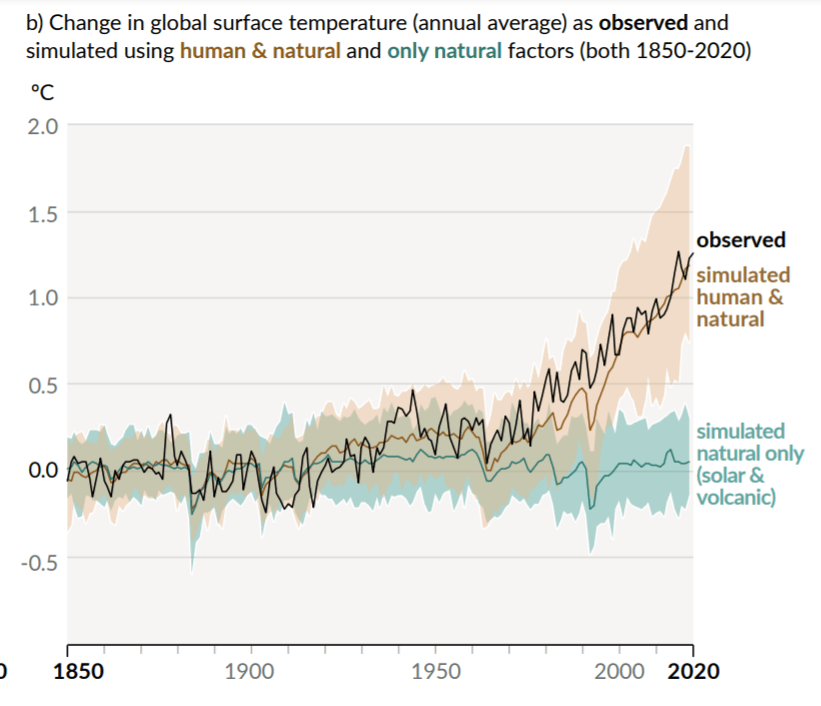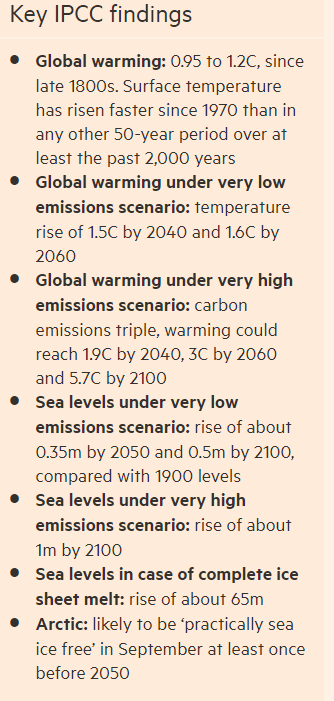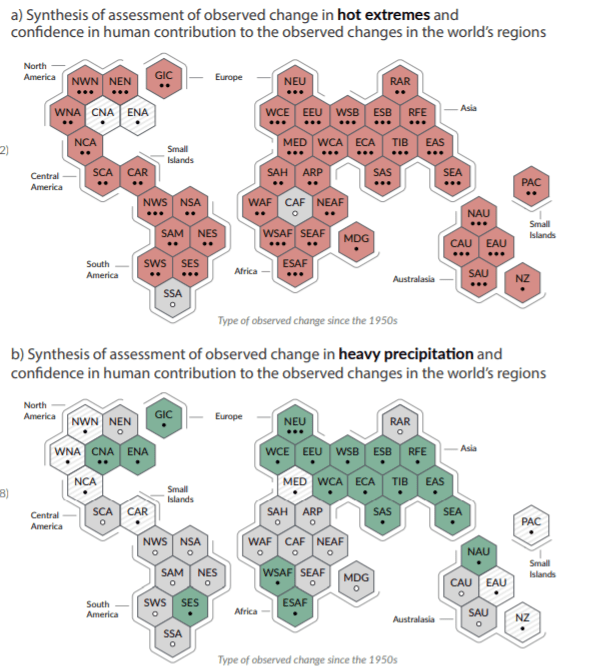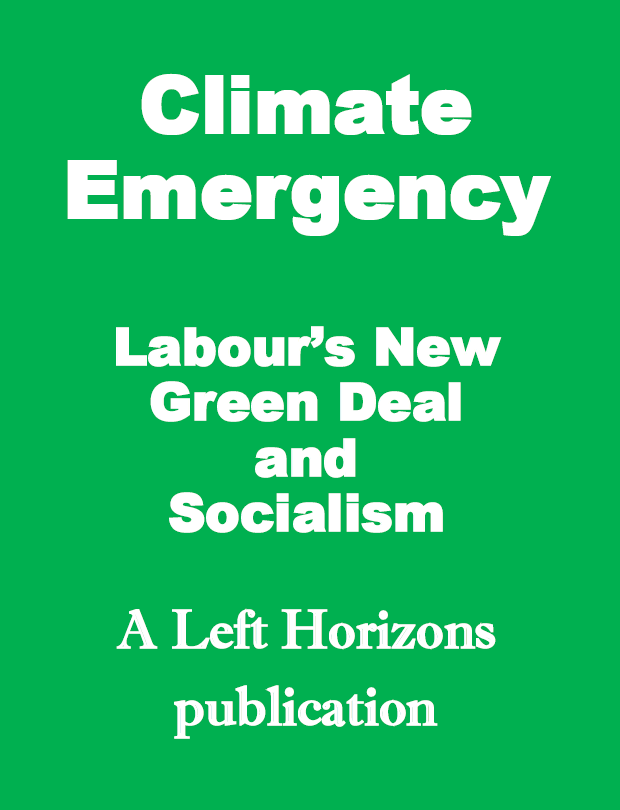Only ten or twenty years ago, most activists in the labour movement would have assumed that climate change, although an important problem, would be one for their children or grandchildren to have to deal with. But it is becoming increasingly clear that it is an issue for now. What is done – or not done – in the next ten years could be decisive for humanity.
The assessment of the Intergovernmental Panel on Climate Change (IPCC) was published this week and made for some grim headlines, that of The Guardian quoted above. It is the sixth report of its kind in the last eight years and summarises the views of 234 scientists who are specialists in the field. The starting point of their analysis is the rise in concentration of greenhouses gases in the atmosphere.

“In 2019,” the report says, “atmospheric CO2 concentrations were higher than at any time in at least 2 million years (high confidence), and concentrations of CH4 and N2O were higher than at any time in at least 800,000 years (very high confidence).”
We are looking at a 1.5o rise by 2040
The net result of the human-induced change in the atmosphere is an increase in the average world temperature. Even on the best-case scenario – in which there are deep cuts in greenhouse gas emissions, they argue that the world is “likely” to see a temperature rise of 1.5o compared to pre-industrial levels, as soon as 2040. Indeed, we are most of the way there already.
There should be no misunderstanding about what that means. We are presently suffering unprecedented numbers of barely containable wildfires, in California, Greece, Turkey, Algeria and Siberia. All of these are contributing in themselves to in carbon dioxide in the atmosphere, and in the case of Siberia, where it has been frozen in permafrost for millennia, to an increase in atmospheric methane as well.
On the basis of the present trajectory, therefore, it is unlikely that we can avoid an overall rise of 1.5o and perhaps in this century we are facing a 2o rise in temperature. In a table listing possible scenarios up to the end of the century, the worst-case scenario of the IPCC shows a possible temperature rise as high as 5.7o, something that would be not so much a ‘disaster’ as a threat to human existence on the planet.

Warming to any degree will means a large sea-level rise and massive changes in weather patterns, with droughts in some places, excessive rainfall in others and a big increase in what used to be called ‘anomalous’, extreme weather events.
We would also be making a serious error if we thought only in terms of gradual change. It is true that climate change, and its effects on local weather patterns have been relatively gradual, measured over decades. But that is up to now. There is ample scope within the patterns of the world’s ocean currents and atmospheric dynamics to produce unexpected, sudden and dramatic changes in climate and regional weather patterns in relatively short periods of time.
We do not intend here to summarise all the findings of the IPCC report. The details can be found in national newspapers, such as the Guardian here, in scientific journals or in the report itself, here. What is important for us are the economic and political implications. Increasingly, researchers and social scientists are talking in terms of societal breakdown and collapse because of climate change. [See our previous article here].
The serious societal implications of climate change
Human society is not so much threatened by forest fires and extreme weather events – although these are all serious and life-threatening episodes in themselves – but by the societal implications of greater climate change. Large parts of the globe will become uninhabitable in the medium and longer term and that will lead to even greater movements of populations than we have had in recent years, itself an unprecedented number. What are also likely to create greater economic, social and political convulsions, on even shorter timescales, are the threats to world food supplies.
While the dire scenario coming out of the IPCC made the headlines in all the newspapers, it lasted barely a day. Far from urging a dramatic shift in resources and priorities towards the “immediate, rapid and large-scale reductions” in carbon emissions – as demanded in the IPCC report – once the initial headlines were out of the way, it was business as usual. It is as if the occupants of a building are smelling smoke, and the fire alarm is going off, but they are blithely going on with their work.
A glance at the Financial Times, shows behind its headline on the day its usual preoccupation with profit, take-overs, deals, profit margins, futures, derivatives, stocks, shares and hedge-funds. What goes for the capitalist media, even the more serious parts of it, goes just as well for the political representatives of the system.
Boris Johnson might occasionally make a gesture about the international meeting on climate change, COP26, planned for Glasgow in November. But in reality, the Golden Buffoon is oblivious to anything beyond making money for himself, his pals and the billionaire class he represents. We cannot have the remotest degree of confidence in ‘leaders’ like Johnson, when it comes to any kind of shift towards a non-carbon economy. Unfortunately, when it comes to opposing Johnson, the Labour leadership are almost an irrelevance.
No confidence in world cooperation
In the international plane, it is much the same. As it is, there is little cooperation between governments on Covid, with the big Pharma companies refusing to relinquish valuable patent rights and the richer countries talking about third ‘booster’ jabs before half the world’s population have even had their first vaccination. Under these circumstances, we can have no confidence that there can be any degree of world cooperation on climate change.

Indeed, the representatives of Saudi Arabia – as befits a government sitting on trillions of dollars of oil production – tried to have the IPCC report watered down. Likewise, the governments in China, Poland, Australia, the USA and elsewhere are hanging onto their coal industries for dear life.
Governments across the world are jealously guarding their own separate interests, which is to say, the privileges, power and prestige of their ruling elites, at the expense of the rest. Right across the world, governments continue to explore for and develop new oil fields, sink new coal mines and prospect for natural gas.
What, then is the message that socialists have to offer? We have to address ourselves first and foremost towards the youth, those who are going to suffer far more proportionally from climate change than their elders, and towards climate activists who are most energised by the issue.
Climate change, we would argue, is not an issue that is separate from ‘ordinary’ politics. It is central to it. It is not humanity in general that has trashed the planet. It is the capitalist system, an economic framework based on greed, profit, personal enrichment and a never-ending increase in ‘production’ for those motives and those alone. Moreover, it is a system that functions entirely based on short-term needs and expediencies.
Millions living from hand to mouth
But as urgent and as pressing as climate change might be, the issue needs to be linked to other political and social issues, like housing, poverty, low pay, health and the day-to-day needs of working people, who constitute the overwhelming majority of the population. Even in the UK, a relatively rich country, a significant minority of the population live from hand to mouth; literally from one week to the next.
How then is it possible to raise awareness of societal problems for the coming years and decades, with those who do not know how they will manage in the coming days and weeks? It is all very well for the smug rich to buy their ludicrously expensive Tesla electric cars, but what alternatives are on offer for the rest, apart from a treadmill of unending insecurity and uncertainty?
If that is true of the UK, it is even more true of many poorer parts of the world. A plan to mitigate the worst effects of climate change – and that is what we need, because it is too late to prevent it – must be linked to a plan to mitigate poverty, disease, and all the other problems of everyday life in Britain and internationally.

We need to fight for socialist policies in all the areas of life that impact to one degree or another on the climate – on energy production and use, on transport, on land use and food production, and on the general use of resources. A socialist ‘green’ policy must encompass all of these areas.
What we face in the next few decades is an existential crisis for humanity. In the shorter term we face a sharpening of all the social and economic problems faced by working class people. There has never been a time when it has been more appropriate to raise the banner of socialist ideas. It is not a question of dogma or labels, socialism is a matter of how best to organise the resources of the planet in a rational and planned manner.
Extraordinary times demand extraordinary policies
The capitalist system is leading the Earth and its population into a dead end, literally. We can no longer afford a system in which half the wealth of the planet is in the hands of a few dozen billionaires, in which all the big decisions on investment, the use of resources and the deployment of science and technology are decide by and based on the needs of an infinitesimally small part of the population.
We must develop in the labour movement a policy and a programme that addresses real industries and real situations. Climate change is linked to all the other ills that affect working class people and socialists need to develop policies that address people’s needs. A policy on climate change needs to deal with how industry, land use, food production, transport and other matters are dealt with.
If we live in extraordinary times – and we do – then we need extraordinary measures to deal with them. We would not advocate the slogan ‘Eat the Rich’, at least not literally, but it is time to develop policies that expropriate the billionaire class and use the resources of society for the common good. The so-called ‘property’ rights of a vanishingly small part of the population cannot stand in the way of the welfare of the overwhelming majority.
Socialist measures in essence are a matter of being able to plan democratically and rationally all the major resources of society. But as the old saying goes, you cannot plan what you don’t control, and you cannot control what you don’t own. Socialists have to fight in the Labour Party, in the trade unions and in climate activist groups, for policies that will put into effect concrete changes. As a minimum, we should argue:
On Energy, for:
*Nationalisation of all energy-production industries, including coal, oil, gas and nuclear power.
*A nationalised electricity grid, integrated with electricity supplies in other states
*Nationalised ‘downstream’ regional electricity delivery companies
*A national investment plan to develop wind, solar, geothermal and tidal energy
*Promotion of research and development all areas of renewable energy, including in hydrogen technology, as a rapid alternative to fossil fuels
On transport, for:
*Re-nationalisation of the railways and the municipalisation of bus services, to develop a locally, regionally and nationally integrated transport plans.
*Development of cheap, safe and reliable public transport systems to reduce dependency on cars for day-to-day transport.
*Compulsory development of safe and viable walkways and cycleways in every town and city as an alternative to the urban domination of cars
*An accelerated shift from petrol and diesel to electric vehicles, by subsidies and tax concessions for clean vehicles. Electric vehicles should not be the preserve of the rich.
On water and land use, for:
*Re-nationalise the water industry.
*Nationalise the big private landowners who control two thirds of national land.
*Develop a massive plan of reforestation of upland areas to mitigate flood risk
*Develop a national plan, in conjunction with a nationalised house-building commission and local authorities, to build a million properly insulated, carbon-neutral homes a year
On food production, for:
*Nationalisation of the big food monopolies
*Government promotion, by tax breaks and other concessions, of plant-based foods and the production of animal protein without animals.
*Compulsory food labelling and ‘traffic-light’ systems on all processed foods.
*Subsidisation of natural foods like fruit vegetables in working class and urban areas to promote consumption
*Adequate public monitoring of all additives in processed food and public information on additives.



